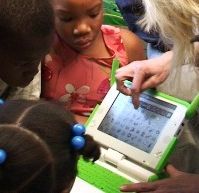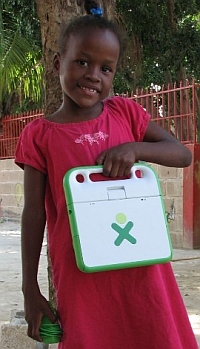Recently, the One Laptop Per Child and the Inter-American Development Bank announced a pilot project in Haiti to test whether one-to-one computing can improve teaching and learning in Haitian schools.
As Haiti is the poorest country in the Western Hemisphere, with abject poverty and no real government services to speak of, I can tell you right now that OLPC's pilot will be a success merely by doing something, anything, to help deliver education to the country's children.
But if we take a more practical, and long-term view of the OLPC Haiti pilot, I say we'll see the good, bad, and ugly of such an endeavor.
The Good
In a direct contraction to Nicholas Negroponte guidance at the November, 2005 IADB meeting, where he told Ministers of Education that "To do a pilot project is ridiculous!," the IADB is not only piloting OLPC, they're also going to have objective testing on the efficacy of a one to one education model:
For a qualitative evaluation, classroom practices will be continuously observed to gage whether one-to-one computing affects attitudes and behaviors regarding school management, how families value education, the use of laptops at home and the perceived educational progress of students.In addition, there will be teacher and student training on the laptops, Negroponte's dreaded "ICT skills" and there will even be a home-grown XO maintenance plan with students in vocational training schools and local information technology advisors.UNESCO's Regional Office on Education in Latin America and the Caribbean will conduct standardized mathematics and language tests before and after the pilot project to evaluate its performance from a quantitative standpoint.
In effect, OLPC is finally realizing that pilot projects are not only required, they are necessary, and they will be subject to objective measurement to determine effectiveness. No one is going to buy laptops by believing in "OLPC magic".
The Bad
One Laptop Per Child faces a real challenge in translating educational content into Creole. Not only is Creole a relatively rare language outside of Haiti, there is a serious dearth of content in Creole presently. Expect a call for Pootle volunteers any day now.
Next, I am disappointed that OLPC and IADB did not build on the efforts of grassroots programs like Waveplace Foundation, which already has connections to Haitian schools, and can provide needed follow-up a stretched-thin OLPC cannot. In addition, OLPC's efforts may reduce Waceplace's ability to get G1G1 participants involved in their worthy efforts.
The Ugly
Haiti is not Peru or Uruguay. It's a failed state that cannot offer even basic services to its citizenry, and outside Port a Prince, the country is run by local mafia and strongmen who brutalize their subjects. It is so bad, Waveplace Foundation staff go everywhere in armored vehicles with armed guards.
To expect Haitian children in this environment to be safe walking around with bring green $200 laptops is the height of denial, Bitfrost be damned. The laptop will have to be locked up at school with prayers that robbers will not break down brick walls to get at the computers. Or as a friend of mine soberly predicted: "There will we see the first child killed for his XO."
On a less morbid thought, but no less challenging one: how will the XO create a long-term change? So what if a poor, rural child "learns learning" in Haiti? What middle or high school could they attend? What college will be realistically in their reach? With such grinding poverty, might Haiti be too poor for the XO?
The Haitian government is definitely too poor to afford an XO pilot. If you look closely, it's the IADB and OLPC itself that are sponsoring this experiment:
The IDB will make a US$3 million grant for the pilot project, which will distribute XO laptops to some 13,200 students and 500 teachers in 60 Haitian primary schools. OLPC will contribute US$2 million to the project.If you do the numbers, 13,700 laptops at $5 million dollars means that Haitian XO's are $365 dollars per laptop. One laptop per child implementation costs are at least double the XO laptop costs - and that's even with SES donating satellite bandwidth for limited Internet connectivity.




> how will the XO create a long-term change?
> So what if a poor, rural child "learns learning" in Haiti?
Education is valuable. If nothing else, these children may one day be parents able to support and encourage their children in ways they are not supported and encouraged.
Additionally, learning learning can be applied to rural life very well. Many farm and water management tasks can be greatly improved through an analysis and deduction process.
Jeff
I agree that education is valuable to parents and farmers, who are often one in the same, but is an XO-empowered education possible in such a poor country? Might Haiti be one of the places that OLPC should pass on for now, until there is a stronger infrastructure - from educational to business to government - that will support the transformation of early learning into adult practice?
To the poorest people in the Western Hemisphere, might OLPC be like asking them to eat cake?
Hi Wayan...
Very interesting to read this OLPC program. I am currently project director of CENEOH and I agree to most of others people saying. In Haiti most school have no facility, no electricity, no water etc. But... please see our web site ceneoh.anandamarga.net, we are having quite good structure to make this project work! Can you help me to get into this program? This will help our school education.
Yudiarsa
@Wayan:
"Might Haiti be one of the places that OLPC should pass on for now, until there is a stronger infrastructure - from educational to business to government - that will support the transformation of early learning into adult practice?"
My interpretation has always been that the OLPC is for those countries that can deliver a minimum in safety and infrastructure. War zones, famines, and war-lords are not where education can make a big difference.
If a minimum level of safety for the children cannot be guaranteed and the XO even reduces their safety, I would say "don't do it!".
If this project can carve out a small patch where education can be realistically applied to the children, I am all for it. But I am afraid Haiti in general is more of a no-go zone for education.
Winter
What ever happened to focusing on the lower-middle income countries, where the worst privations were taken care of? Sure, education is valuable, but that presumes the children have the luxury of spending time at school (or even at home with their XO) instead of contributing to the family income? TakingITGlobal has a cute if frustrating fictionalized version of Haiti as a "game" where you have to balance education against income, food, and treating disease: http://www.takingitglobal.org/tiged/projects/ayiti/game.html
I am sure other people know better, but I am rather positive there is a group of people even in Haiti that has a better standard of living that the utmost abject poverty that is usually displayed. Higher level government employees, assorted carpetbaggers and in-betweens for international aid are sure to be found. They have kids too, and they have hope, including hope of further education. That the statistics show low _average_ income does not mean that's the end of the story. Likewise, I believe there is much need among poorer strata in oil rich countries, where per capita GNP is huge, yet large numbers are not reached with quality education either, maybe because they are migrant workers imported to do work locals no longer want to do. Oh my, I didn't mean it that way, but after all I DO live in Texas...
Well... I would suggest instead of stopping this program which is very helpful for the better education of Haitian children, rather to change the implementation. For example instead of giving one laptop to kids to take home where they live there is no electricity and also endanger kids safety. We could keep and use those laptop in the school where there is enough safety for keeping these laptop, electricity for using them etc. I am sure with this in mind several and many school can make good use of this program for education in Haiti.
Thanks
You are a bit behind on support for Haitian Creole/Kreyòl Ayisyen. The call went out a while ago, and we have the project started. Of course, we can always use more volunteers. http://dev.laptop.org/translate/ht
As for the rest of your hand-wringing, tell it to Paul Farmer of Partners in Health/Zanmi Lasanté http://www.pih.org/ They provide health care to more than a million of the poorest Haitians (which is saying something). I would recommend putting some XOs up in their territory in the hills, which isn't run by gangs. Services can be provided in Haiti, but only by people who won't take no for an answer. Like Farmer, who refused to accept deaths from multi-drug-resistant tuberculosis (MDR-TB), which WHO and everybody had written off as beyond practical help. Farmer and his people came up with Directly Observed Therapy to guarantee that TB patients took the full course of medicine. PIH's Peru project, profiled in the PBS series Rx for Survival, convinced WHO to reverse course and recommend that all governments treat MDR-TB.
As Alan Kay has said, "The best way to predict the future is to invent it." Thinking you already know the answers is the best way to guarantee you won't find any new ones.
Wayan, that's a pretty fair assessment and definitely not hand-wringing. As for a more affluent sector in Haiti, yes. Many lived in Petionville, up in the hills above Port au Prince. These are the folks who shopped in Miami and New York and many have taken refuge there too during the current chaos.
I recommend Paul Collier's book "The bottom billion" about the states like Haiti and Chad which has so much going against them. The kinds of assistance they can use differs quite a lot from Peru, Uganda, and others that are not in such dire straits.
Ed,
If only OLPC could compare to PIH.
Paul Farmer took 20 years to develop PIH through close observation of small trials that were well documented, peer reviewed, then methodologically scaled up. All along the way Paul's focus was getting local buy-in first, then engaging local people and NGO's in every step, and using the least amount of technology possible.
Better yet, I challenge you to find the OLPC methodology that shows a dedication to build on and with local educational infrastructure and leadership like this:
----
In each of our expansion sites, we have partnered with other nongovernmental organizations and the Haitian Ministry of Health to rebuild or refurbish existing clinics and hospitals, introduce essential drugs to the formulary, establish laboratories, train and pay community heath workers, and complement Ministry of Health personnel with PIH-trained staff.
------
To Whom It May Concern:
We, at Las Caravellas De Bolosse Inc., would like to donate 10 of your computers to a primary school in Port-au-Prince, Haiti.
We are a Not for profit organization,registered in the state of New York (501 c3).
Could you help us get these computers? If yes,how long will it take to get them?
Best regards,
Whaitman Holly
Las Caravellas de Bolosse,Inc.
116-42 142nd ST.
South Ozone Park, NY 11436
Tel. 917-930-7756
Hi OLPCNews,
It's been a while since I have dropped in, but I have been lurking.
here is my analysis, strategy, and project proposal for humane communications over a human network in haiti.
http://alchemicalmusings.org/2010/01/16/humane-communications-over-human-networks/
I would really love this communities feedback on these ideas.
Best regards,
/Jonah